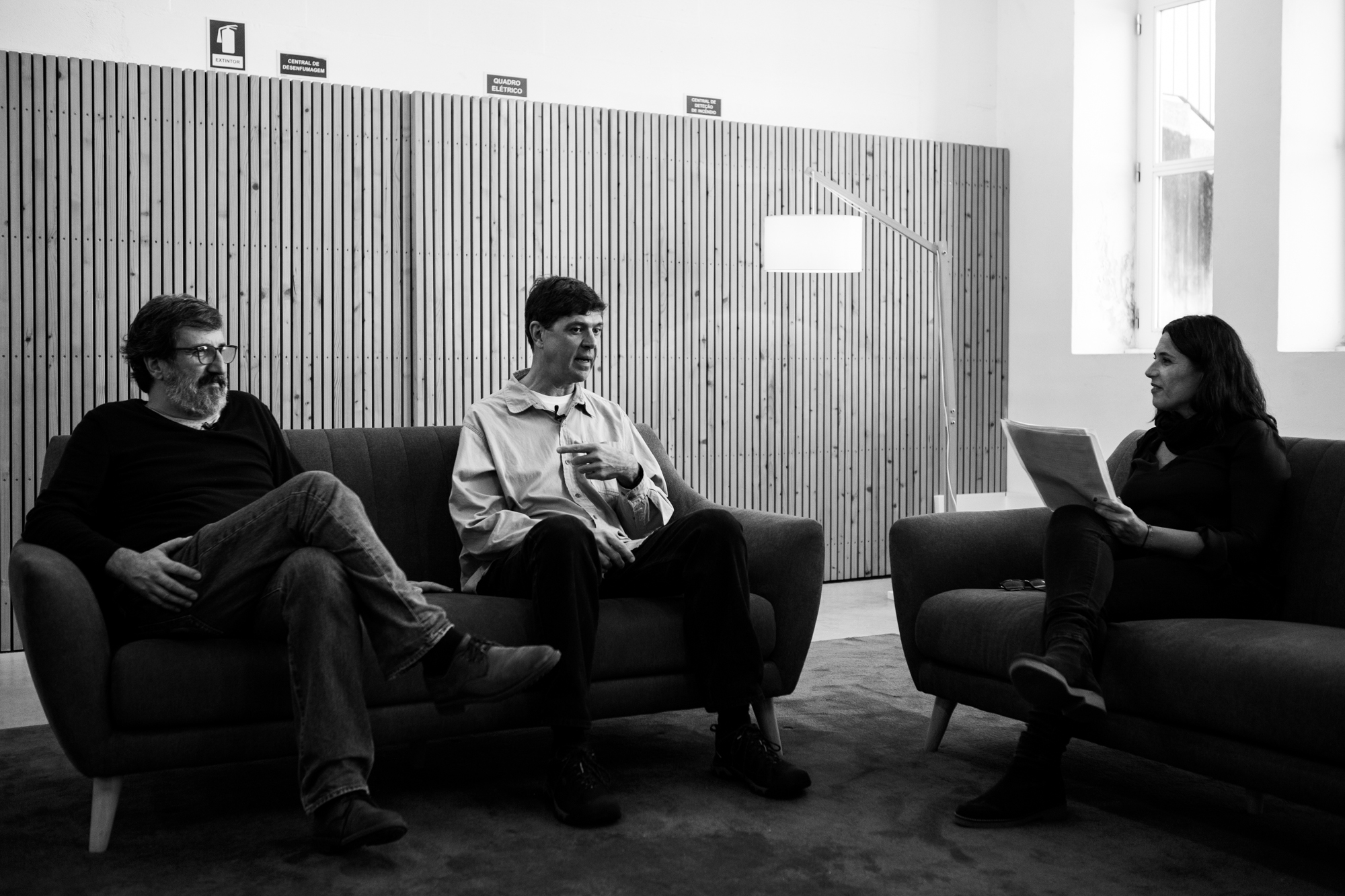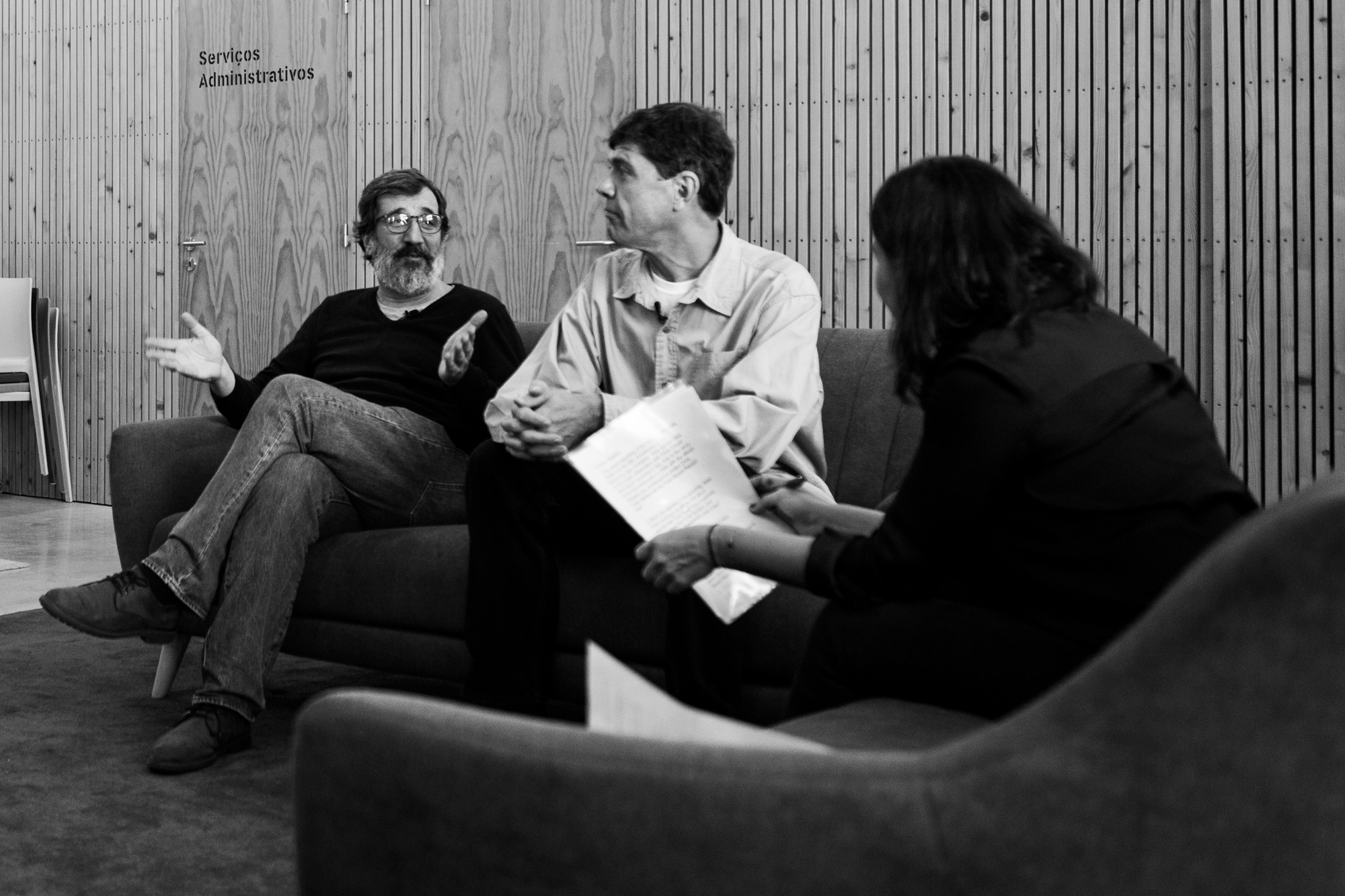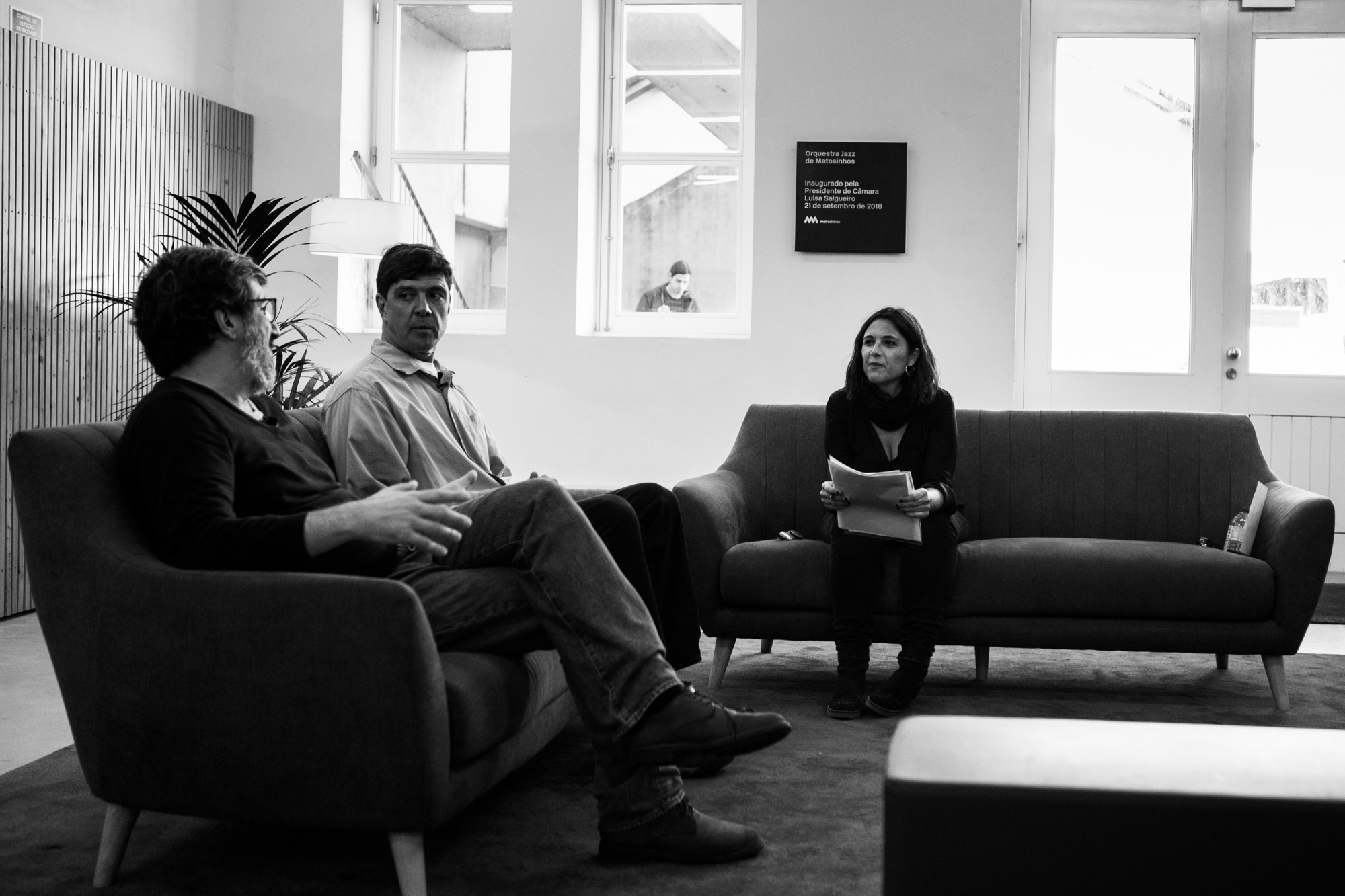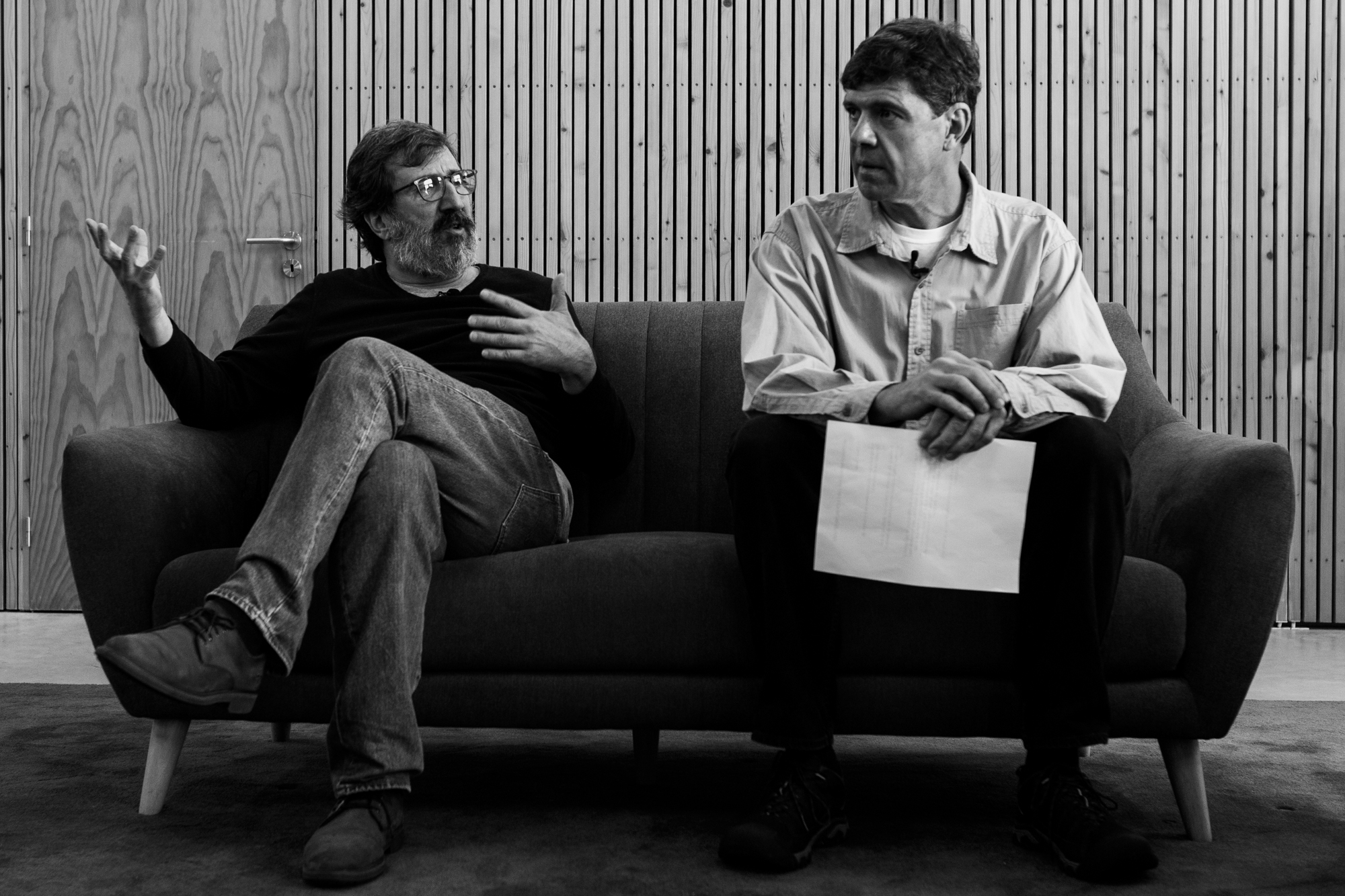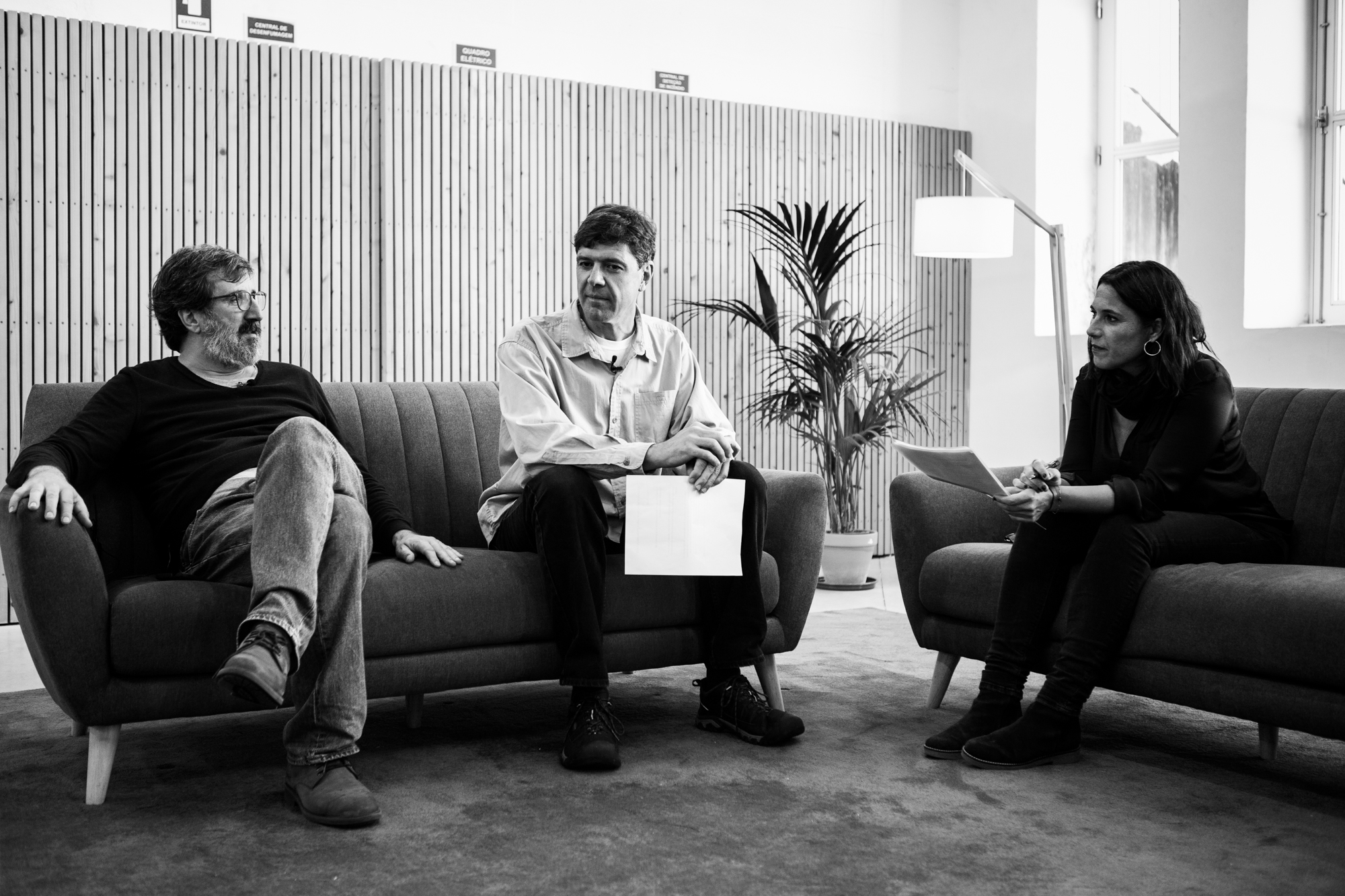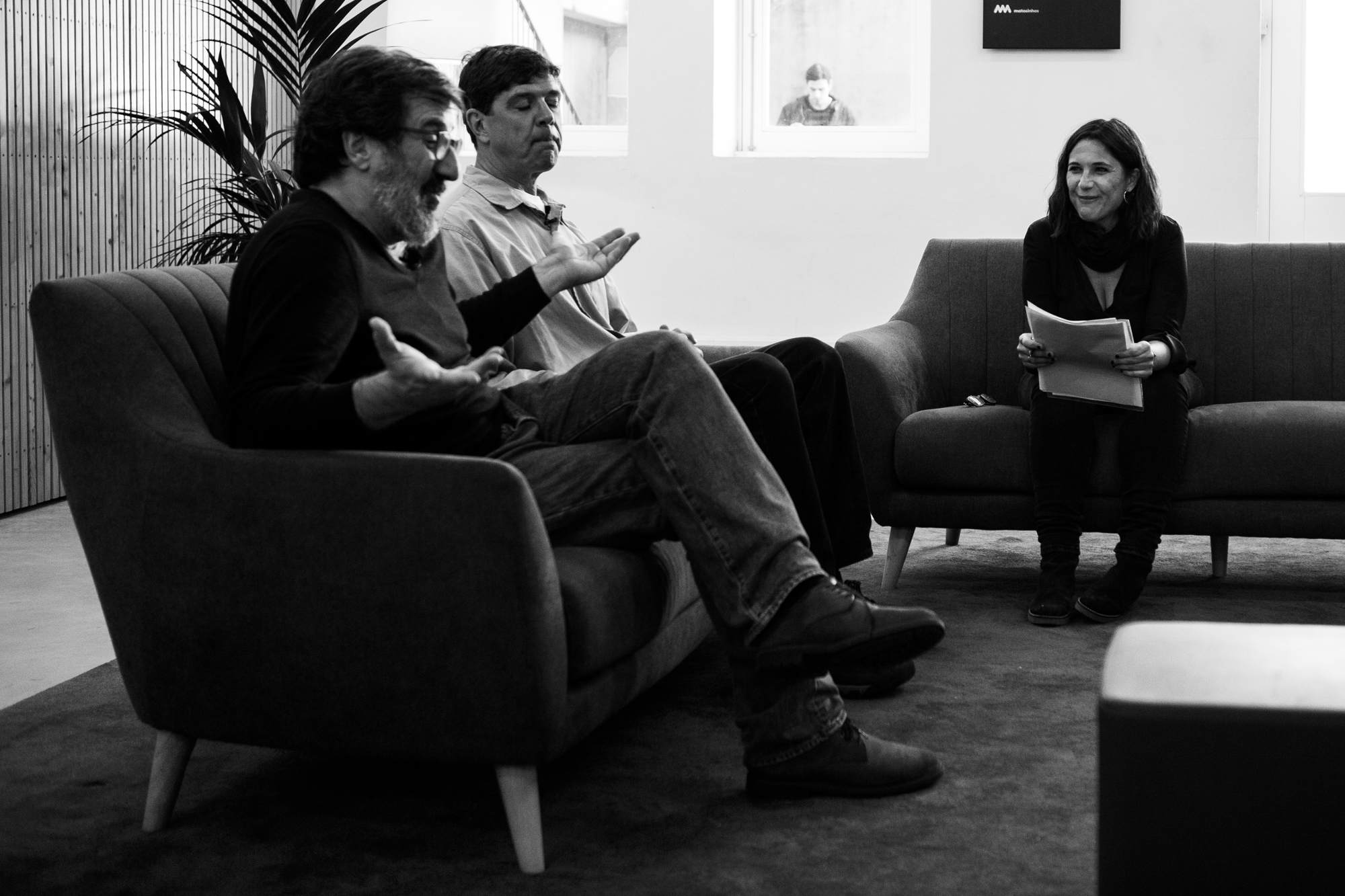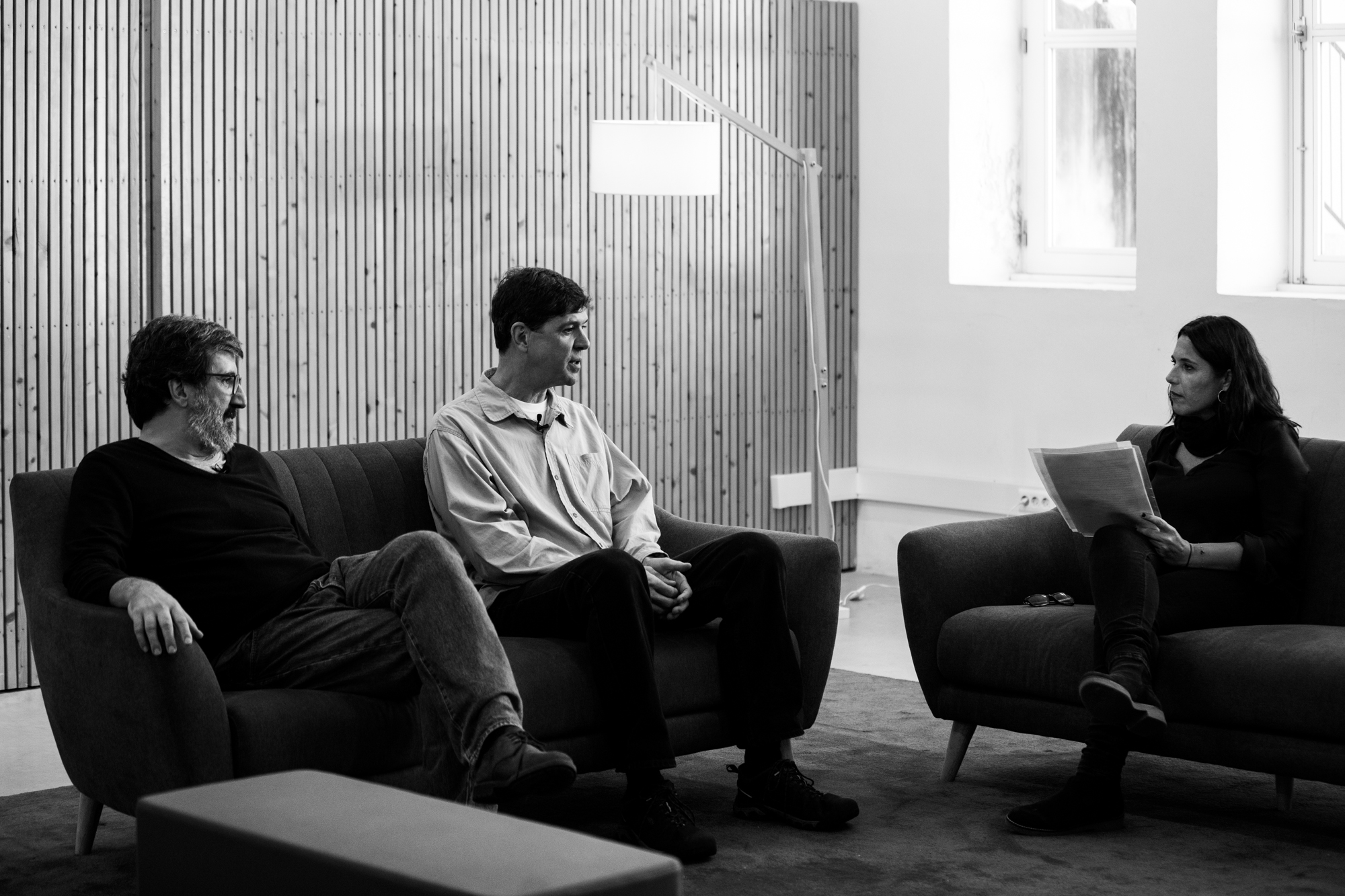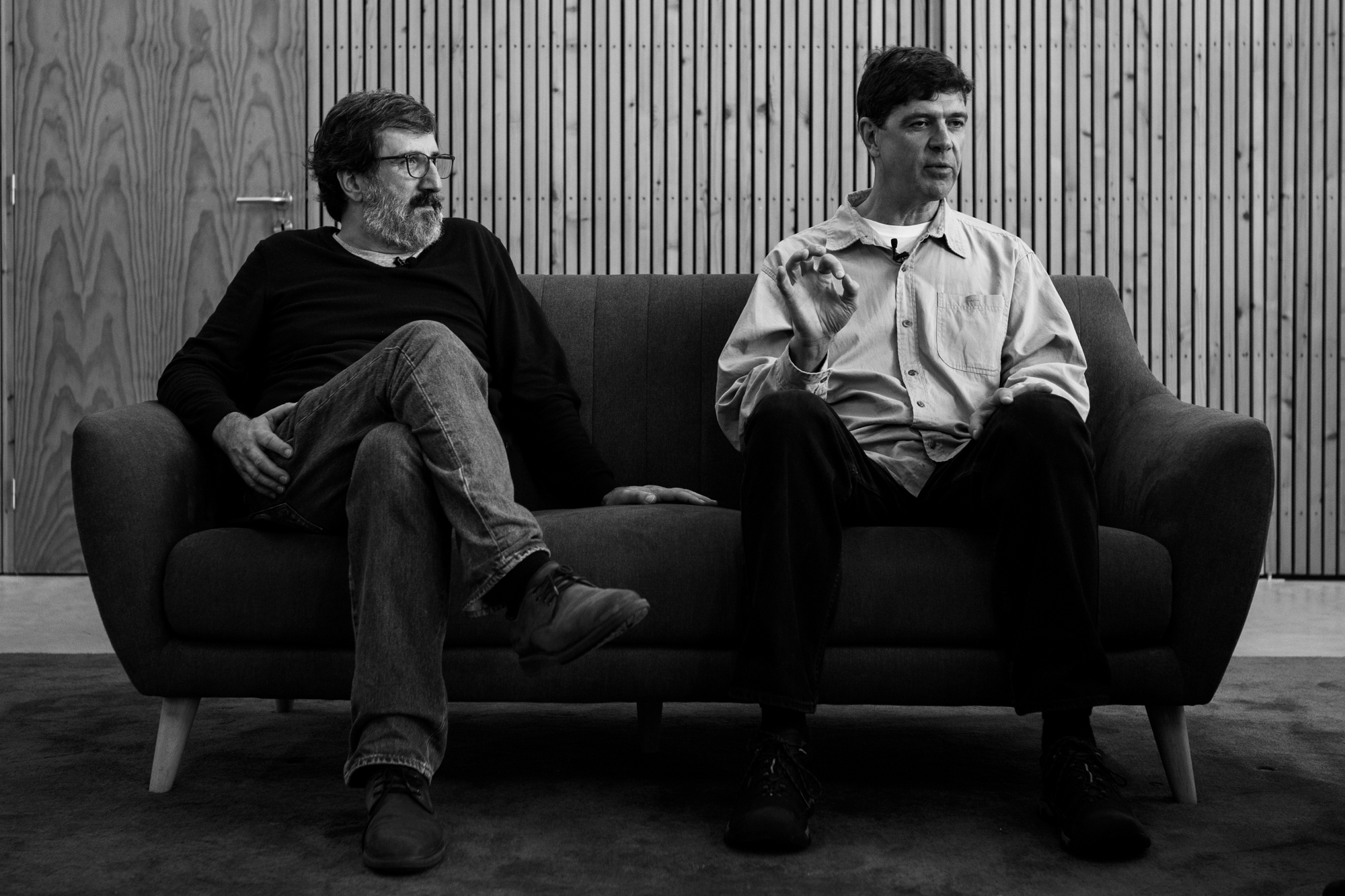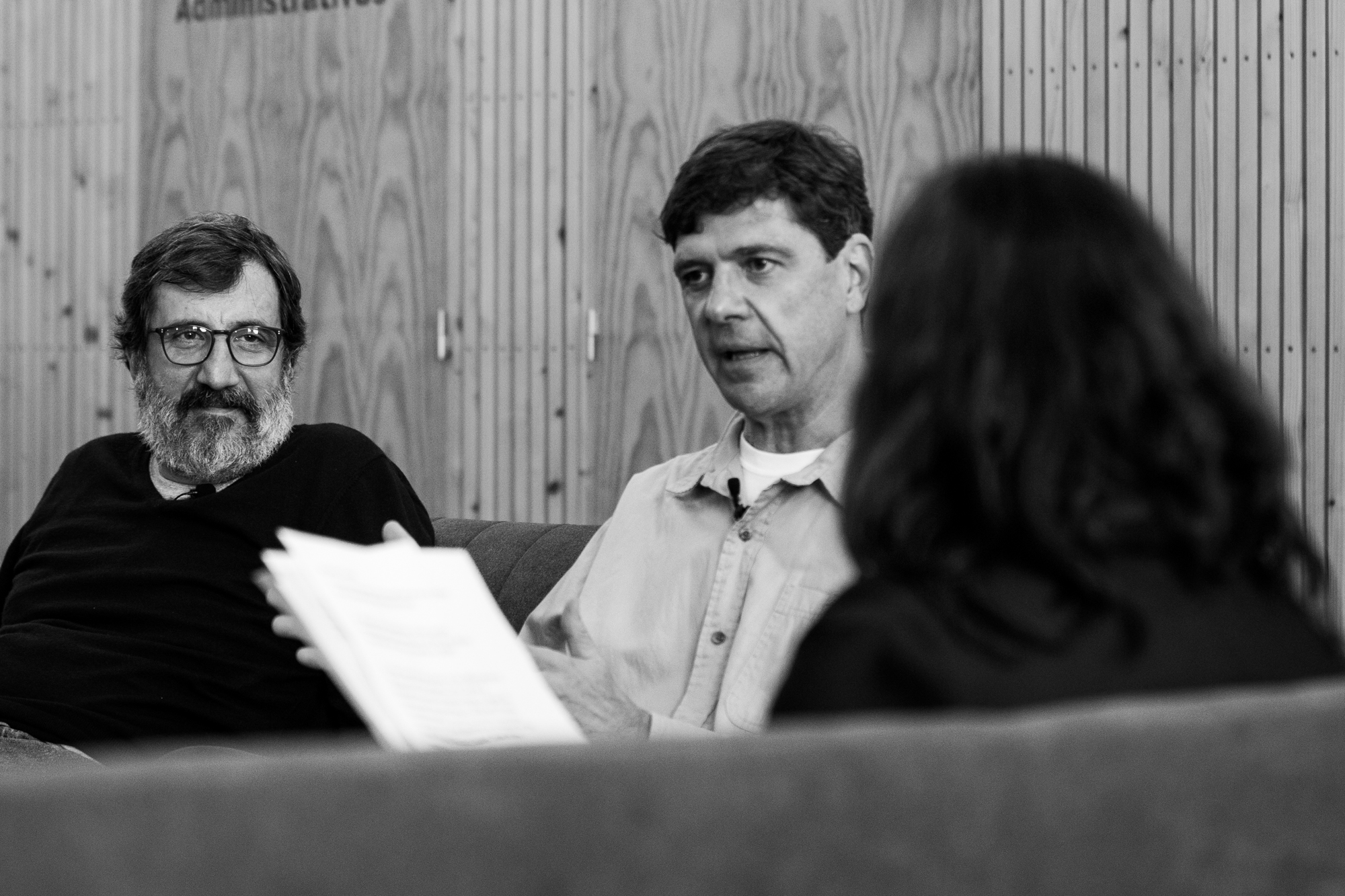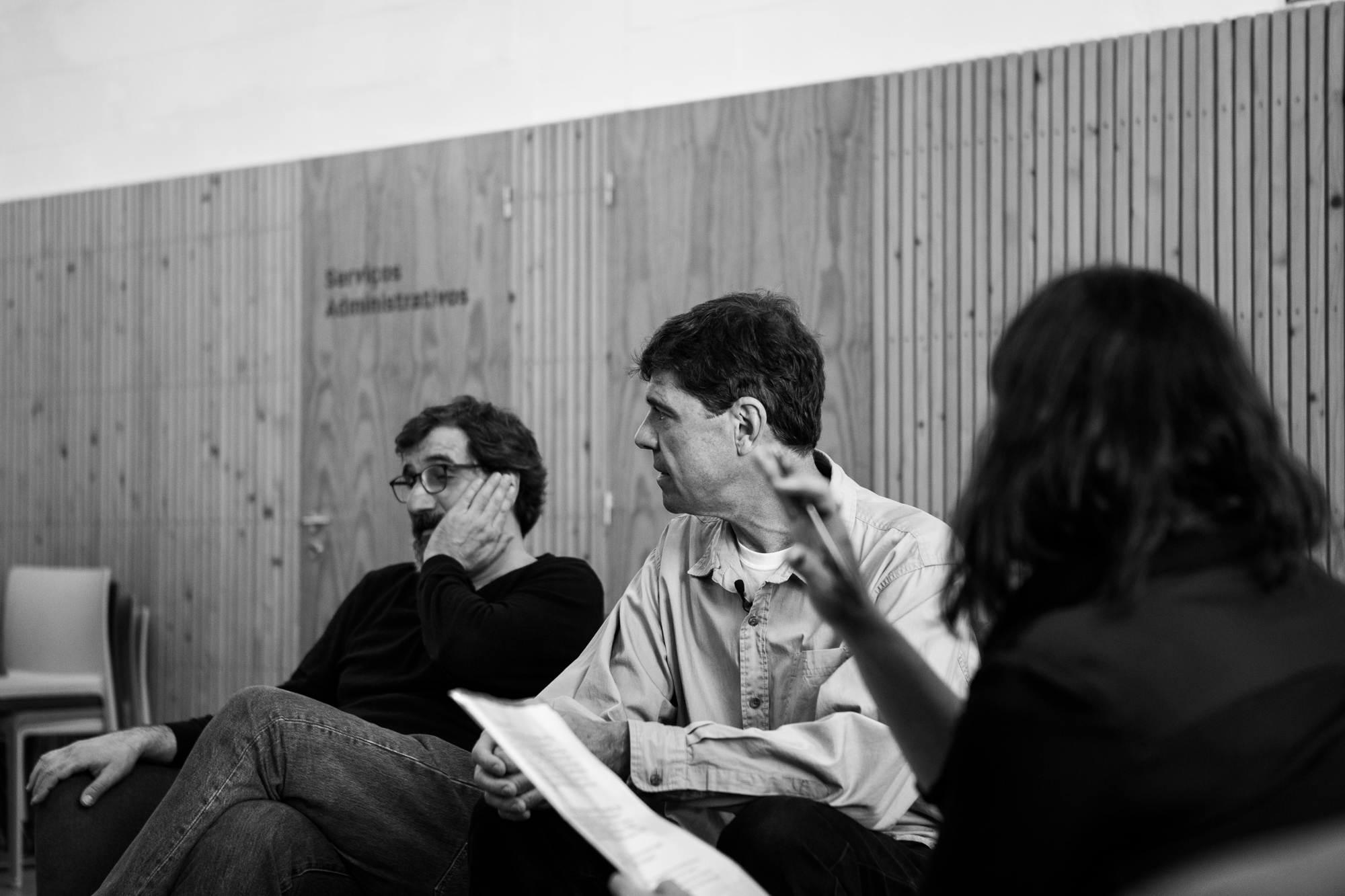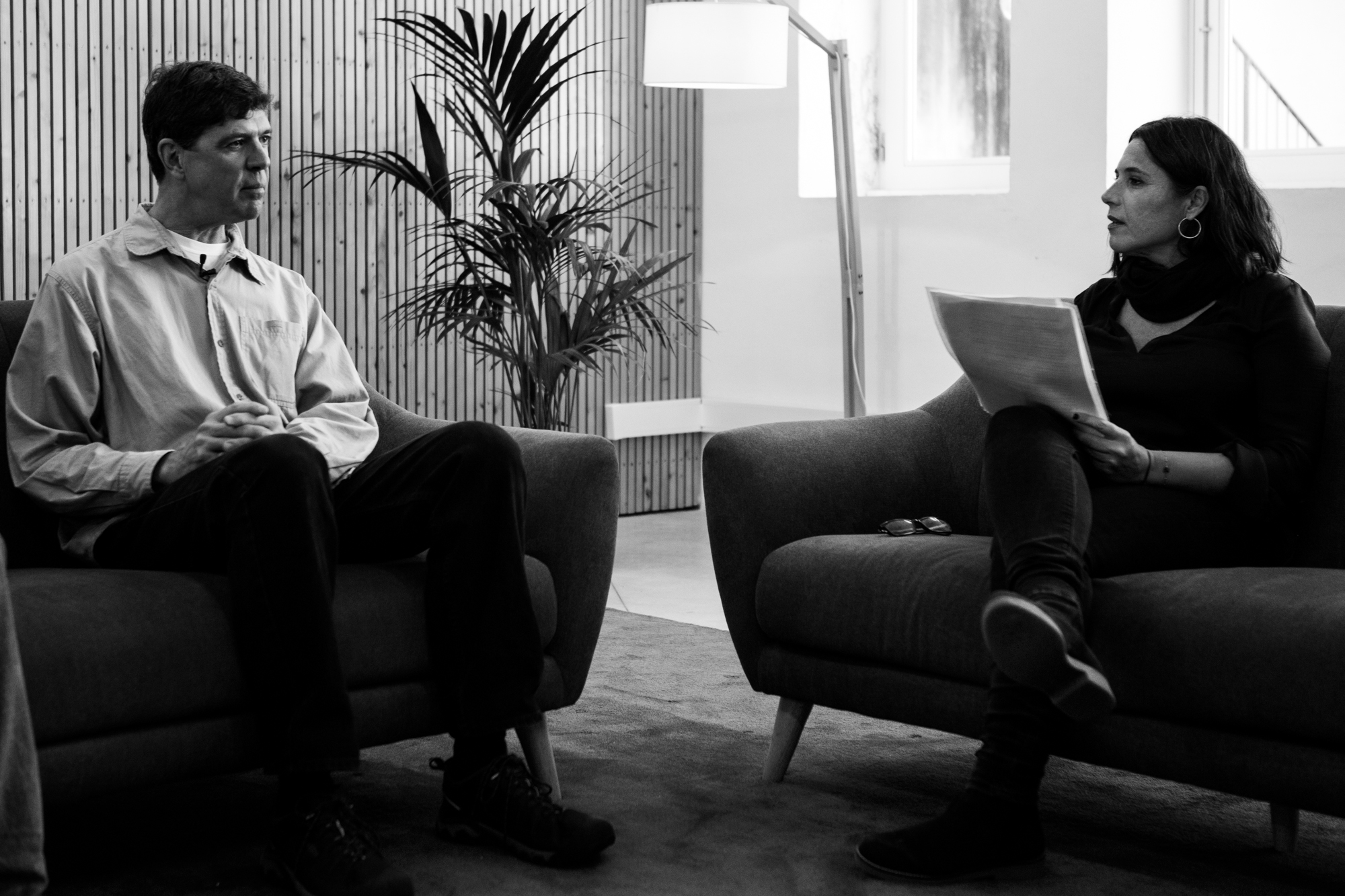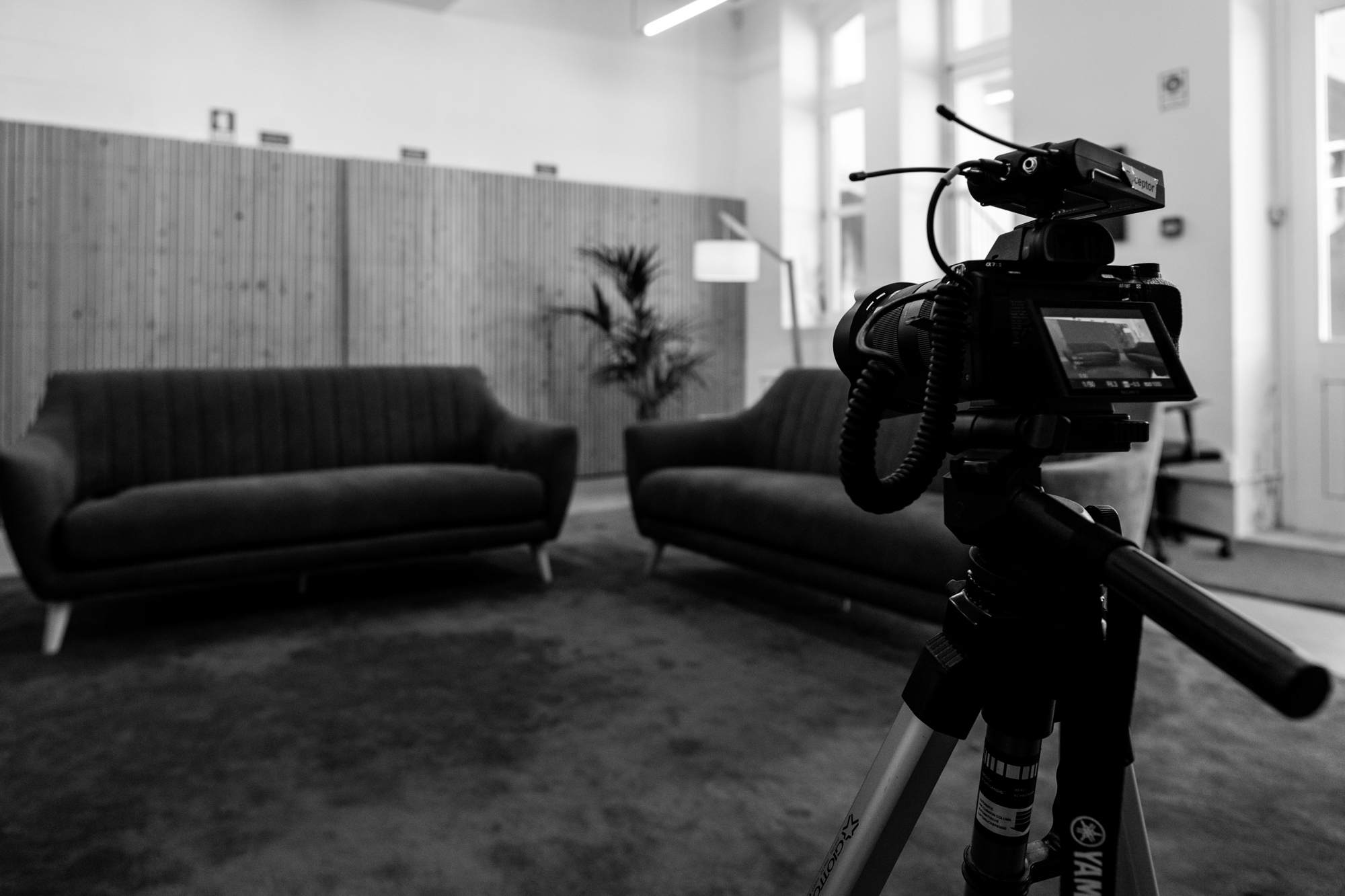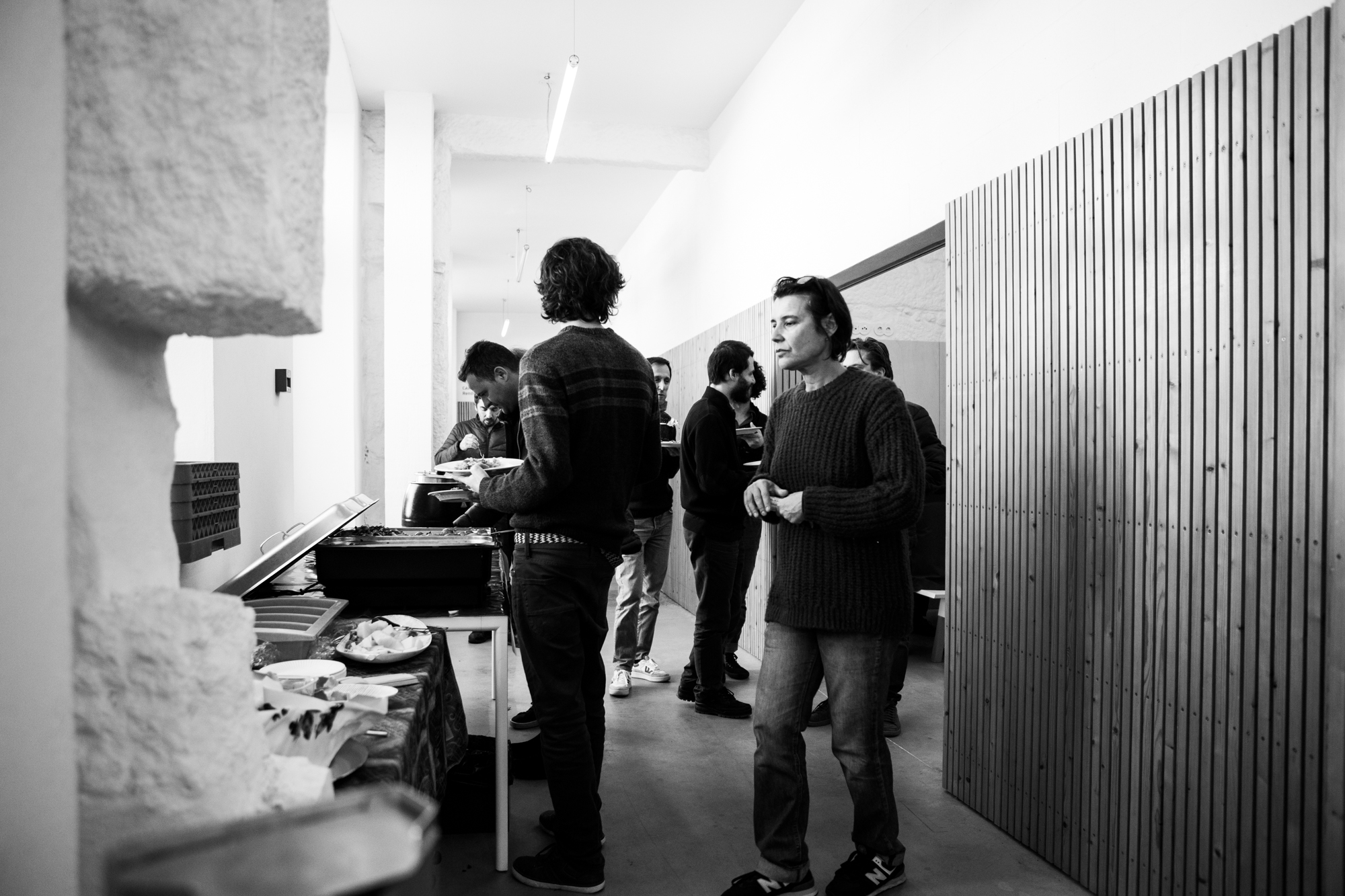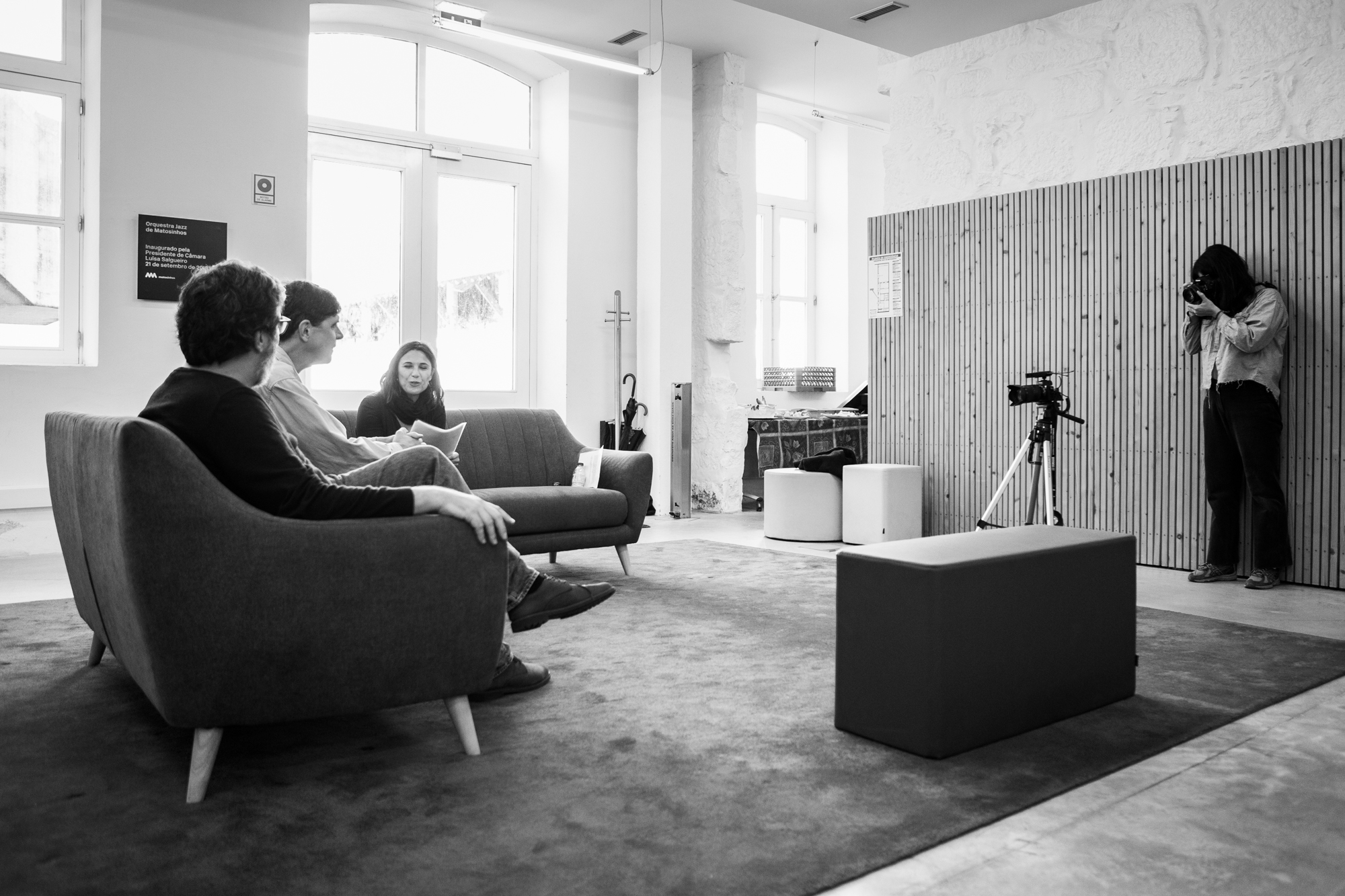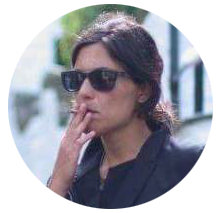Pedro Guedes & Chris Cheek
Orchestra Jazz Matosinhos – Interview
18
ABRIL, 2023
In the evening of December1st I had the pleasure of interviewing Pedro Guedes, the director of the Portuguese National Jazz Orchestra, Matosinhos Jazz Orchestra, and the great American saxophonist Chris Cheek. The interview was done during the recording session of the new album at CARA studios, Matosinhos, Porto (Portugal).
In&OutJazz The first questions are for Pedro. The first question is about your first collaboration in 2006. What’s the story of your first collaboration with the album Orchestra Jazz de Matosinhos Invites Chris Cheek with the Fresh Sound Record label?
Pedro Guedes Okay, so, basically Carlos (Acevedo) and me, we have great music, and we were considering working with Chris and Mark Turner because they were like the new breed of tenor saxophone players that were emerging in the jazz scene. So, we wanted very much to be with them, to share the music with them. And it was really important because it brought to our music a different dimension. Both of them in different ways, they brought a totally different approach to the music, and that was felt with the band, within the band. And it helped us really a lot, just having the chance to have, I mean, two improvisers of quality of Chris Cheek and Mark Turner. Just helped us very much, so it was challenging.
Thank you. And according to this, how is the story of the actual collaboration for the 25th anniversary of…?
Pedro Guedes Okay, the idea now was…first of all, Chris became really expert on understanding our music and he can really easily to relate to our music. And he’s almost, he’s an improviser and he’s a soloist, but he’s a member of the band. We truly think that Chris is a member of the band. So, in that sense was just trying to recreate, with songs that we haven’t recorded in the past, that same flow that was in 2006, and it is still nowadays present whenever we get together it’s like… “okay, well welcome back to the band hahaha!”.
And, your recording is a repertoire written specially for the Big Band, what compositional characteristics does it have?
Pedro Guedes Okay, basically it’s not a big deal, it’s just music that was made for the band and that I have in mind having a soloist. So, this music wasn’t recorded yet, so we had to do that. And fortunately, we found on the 25th anniversary a reason to get together again and now with our studio which is…
In&OutJazz Two days of studio, right?
Pedro Guedes Two days of studio. We are doing a new record, featuring the music of Carlos Azevedo .
In&OutJazz Okay. And in your opinion what is Chris Cheek’s contribution to the Orchestra?
Pedro Guedes Well, I think I have several. I have said it. I mean, throughout, from 2006 and till nowadays we have been in touch on and off, but on at least once per year or once every two years what he would get. So, and, we established, I mean, I think Chris established with every single member of the band like a personal relationship, and we have that. And when we play, I think that comes out, that sense of knowing each other that well, I think it comes out. It comes out and it’s a beautiful thing, it’s nice.
In&OutJazz And how have the evolution or the differences of the sound of the project Chris Cheek & Matosinhos Jazz Orchestra been in these twenty years since the recording in 2006 with Fresh Sound Records
Pedro Guedes Oh, a lot. A lot. For the first record, okay, I’ll tell you a secret. For the first record, most editing was needed hahaha. This one time the editing will be minimal because we now play much better, the sound of the band has come together, we have grown as a band. Throughout the years we have been experiencing so many different types of music and so many different approaches that goes from the hardcore contemporary to like music from the beginning of the 19th century for jazz orchestra so this pans, those different repertories just gave us a sound that we are creating, and still creating, and evolving. I think we are on the right track and that’s the sound we want, we just need to be better doing it… like that’s what you need to do always right? Just try to do it better.
In&OutJazz Great! and how would you describe the sound identity of the orchestra?
Pedro Guedes How would I describe…the identity? Okay…This is interesting because this is probably because I went to study in the United States. I think that this orchestra is more Atlantic that Continental, meaning we look more towards the other side of the Atlantic instead of looking into Europe. That’s what it is, and I think, actually, well for instance, 90% of the musical guests that we had were Americans, so in that’s sense, and I think that Portugal is pretty much like that, we are Atlantic, we are not looking inside to the Continental Europe. So, I think it’s great so we can have, we would like to be like the main interest of the American musicians and the European musicians, we want to keep on working with that. Not saying that what is then in Europe we want to be away, no, but it’s more natural, I don’t know why I don’t have a great explanation, just by the fact, but there’s that.
Chris Cheek That’s interesting but it’s nice. Must be the jet stream.
Pedro Guedes Hahaha exactly, the jet stream. Yeah, the currents, you can go Lanzarote, Canarias, Azores, Portugal, and then..
Chris Cheek Watch you back around hahaha!
In&OutJazz How is to play the Matosinhos band?
Chris Cheek Well, there’s no big band like Matosinhos, it’s very unique you know. I’ve worked with some big bands but you know, Pedro and Carlos have been very generous and accepting and involving me to come play with them and work with them. And, so it’s been a really unique opportunity, I haven’t had the same kind of relationship with any other big band in the States or anywhere else in Europe. So, for me it’s like a real privilege and a real gift to work with these great writers and this great band. They really have a unique perspective on music and life and the experience of playing together. And Pedro’s right, it really is like a big family, it’s really refreshing to be around and to be welcomed by them, it’s been just like a big joy in my life, you know, personally and musically. It’s hard to put it into words you know, how to describe the music. It’s very unique and they have their own individual influences, musically and from living here that are reflected in their music. So, for me it’s very interesting and very different. I always enjoy it and always hear something new, and I also like it because it’s very challenging, melodically and rhythmically and harmonically.
The compositions of Pedro?
Chris Cheek Yes. A lot of times I don’t know what’s happening, but I have grown to be okay with feeling that way, and just kind of…, it’s just like jumping in the ocean you know, you just go and see where it takes you. And to me the music is kind of like that, it’s kind of like being in the sea somehow. Sometimes it’s kind of turbulent and like unpredictable but you always wind up okay somehow, I don’t know hahaha.
And the first album with CARA/OMJ label in in the year 2020 with the recording of the album Jazz in the Space Age. Is this a new label of the Orchestra?
Pedro Guedes Yes, yes. Okay, finally we have a studio so we can we record whenever we want, so this gave us the opportunity…, and we need to have an editorial voice, we want to have our voice and that was supported by this institution, so we found it, the label CARA. CARA is one acronym of, in Portuguese “Centro d’Alto Rendimento Artistico”. So, Center for High Performance…, in English I don’t know exactly how to translate it. So basically, what we wanted…, this is a space where music, we investigate and we search for the music and we can see with the huge microscope to the detail what’s correct and what is wrong. And learning from that, correcting things, and just keeping the loop, because it is endless. Having our record label is really important for us because I don’t want to have no body saying what we should do. We should decide what we want and just putting out what we think, it is really interesting to be outside of that.
How has the experience of the orchestra been with the Jazz in the Space Age project at the Madrid International Jazz Festival a week ago?
Pedro Guedes Well, it was amazing, it was really good. Firstly, because the audience was really an audience that was versed in jazz, they know what jazz is and you can feel that like really… I felt that like really, after the first song! So, it was great in that sense. We played to people that were really there for the music and were interested on being exposed to that music. And the second thing was that we had seven hours delay flight here in Portugal, yes it was madness, I was like…We arrived in Madrid at four o’clock, we had soundcheck at five, we had played the night before, we didn’t get much rest, so I was like…oh my goodness, will we be able to get the right energy to play? But thankfully we are a team in that sense, everything just…, when we need to focus, we can do that.
Pedro, now you are the sole leader of the Matosinhos Orchestra, how has the transition been after spending so much time with Carlos Azevedo?
Pedro Guedes Well, it was natural, I mean there are times, there are periods of time for everything, so in that sense Carlos felt, one year ago or one year and a half, that he felt that he would like to do something else differently. So, in the terms of the band, of course, Carlos not being on the project with us, it’s someone that was really present that is missing. But in the terms of music, in terms of growing musically, I think we are just keeping with the pace, just moving forward. So, it is more kind of a musical and personal loss, but I think we are doing fine, we have much time to go ahead and progress and just keep doing our thing.
The Jazz Orchestra starts in 1997. What is the secret for an orchestra to last for decades?
Pedro Guedes What is the secret? Well, I don’t know, it’s just being stubborn: “This has to work, we need to have a band”. And we just say that every single day for twenty five years. “We need to have a band. We are going to make a record. We are going to work in the studio” hahahaha.
That’s how it is.
Chris Cheek Well, it takes someone to organize it too and to push it to make it happen, and you know, Pedro, the reason the band is together is because of Pedro’s ambition and his drive and his vision about what the band could be. And now he has this beautiful place here, this opportunity for everyone to rehearse and perform. Because it doesn’t happen by itself. It’s a huge job to organize fourteen musicians, to come together, scheduling, and finding the time, and finding the place. And then you need gigs, you can’t just rehearse, you have to have a place to play, and opportunities to perform. And they’ve had a great relationship with Casa da Musica in Oporto, as a venue and outlet for the music, so that’s given them a lot of momentum and kept the band rolling these years.
And what is the experience in Casa da Musica?
Chris Cheek The experience in Casa da Musica…It’s a beautiful building. The facilities are incredible, they have worldclass instruments and it’s very soundproof, it’s a pleasure to rehearse there…and yeah, they have a good cafeteria, nice place to take a break too. They always seem to find room and time for us to rehearse there and then to have openings in their concert series for the band to perform there also. Well, we played there last night and the sound was great. The people doing the sound there really know what they’re doing and they have good microphones, good speakers and monitors and they’re very capable class people when it comes to mixing and monitoring sound and it makes playing music that much easier when it sounds good so yeah, great.
And how is your experience like a leader soloist in an Orchestra Jazz Matosinhos?
Chris Cheek Yeah, well actually I feel a little guilty because for me it’s just like kind of fun. I don’t wanna say easy, because I find the music like a really have to be engaged and listen and deal with kind of some unfamiliar rhythms and harmonic progressions, but I get to have all the fun. I get to improvise. I have a lot of written material, but basically, I get to improvise over the forms and to me it’s very interesting to hear what these guys write and hear their melodic sensibilities, and the phrases. So, for me as an improviser it gives me like a, it’s like a whole new world to kind of explore that I find really engaging and interesting. And to play with great musicians who are listening and supportive and playing really tastefully and musically and in tune. It’s a great pleasure, I’m always just like grateful and surprised when they ask me to come back and play with them, I just really enjoy it and look forward to it. So, yeah, thank you.
What are the skills and benefits of playing as a soloist in a large orchestra?
Chris Cheek What are the skills…Well the skills I guess, as a soloist the skills that are required are being able to sometime navigate the music and the materials. What I find interesting is sometimes, you know, instrumental music is very abstract, if there’s no text, there’s no lyrics, it’s hard to know what the song is about. Even now I find instrumental music, it’s hard to know what it is. Sometimes it can be very impressionistic. If you hear melodies, or if you hear themes, and you hear the repetitions of those themes. That gives you a sense of what’s happening. But a lot of it is very mysterious still, even to my ears, like hearing the tunes I don’t know what’s happening. You have the trumpets and the trombones, and the saxophones, each section is doing something independently, sometimes they overlap, sometimes they contrast. So, it just requires you to listen to the different sections and the different parts and to be able to hear like melodic cues and to hear rhythmic information, different grooves and rhythmic pulses and to somehow bounce that in a musical way. It’s very subjective, I mean someone else could come in
and approach it very differently than I do. But I think it just requires the soloist to be open and listening, but also have the ability to navigate some different tricky rhythmic changes, there’s a lot of meter changes. Sometimes we’ll be playing in like 4/4 or 6/4 and then suddenly, what seems like for no reason we’ll go to 5/4 you know. So that’s…, and you have to be able to kind of fit…, I’m still trying to, I think I’m still trying to do that effectively, to be able to play in the3 form of the tune. Yeah, the music asks the soloist to be as tasteful and thoughtful as the composition because the compositions are really well crafted. This is a very high level of writing and arranging, it comes from just years of doing it and years of study and practice. So, I think it just asks the soloist to bring the same integrity and intensity and honesty to the music, somehow hahaha.
According to this, what differential characteristics as a soloist do you find in the language of Guedes and Azevedo?
Chris Cheek Yeah, it’s not like your typical big band music, I mean I don’t know what your typical…, I mean big band music has changed a lot, it’s really evolved. Pedro and Carlos, both have the traditional big band influences, but they also have like a whole range of other modern contemporary musical influences. I don’t even know what jazz means anymore, because it can be so many different things, and their music is an example of that. It’s jazz because there’s improvising and it’s instrumental basically.
Pedro Guedes And we have studied jazz so it is in ourselves.
Chris Cheek Yeah, they’re respected traditions, there’s certain I guess like rules that they respect like rhythmically and harmonically, you know with the voicing structures and blending instruments together, but it’s also very experimental. Combinations of instruments and melodic ideas and harmonic relationships. That to me is where they’re moving forward, you’ve been pleasant with what they like, and what they hear and what they wanna try and what they have the opportunity to try with this band. Does that make sense?
Last question. You have recorded four albums with Fresh Sound Records, what’s your experience?
Chris Cheek Oh, Jordi Pujol is great, I mean, I feel like I owe my career in a large part to him, and having the opportunity to record with him, not only as a leader but as a sideman. He gave an opportunity to a lot of young kind of unknow musicians at a time when…I mean jazz is never been a big seller, and Jordi Pujol is one of the people that keeps jazz alive because he loves it. And the music is kept not alive not because of the income and the commercial viability of it, it’s because people love it more than do it. So yeah, Jordi’s given me and hundreds of people the opportunity to record and have the music out there which helps me to other connections and opportunities so, yeah, I owe, I’m really grateful to him for helping me to have a chance to record and play with people and, yeah. He’s also like one of the hardest-working people I know. I saw him few years ago and he said: “I’m so lucky that I wake up every day and I go do something that I wanna do”. That keeps him going. It’s hard, I mean the record business is like, it’s really changed and come down a lot. Even in our lifetimes, recently. So, the fact that he’s so driven and so passionate about it really affects countless people, he’s a very important figure in jazz, in the world, and has been for decades.
Pedro Guedes And he actually was one of, one European that made the connection between the United States and Europe, equally did that and he’s still doing.
Chris Cheek Right, yeah, he built a bridge, definitely.
Pedro Guedes Despite the fact that he’s in the Mediterranean Sea, he looks for the Atlantic.
Chris Cheek Yeah, he’s a worldview
Okay, thank you so much . It’s finished.
Pedro Guedes Yeah, great, you’re welcome.
Written by Begoña Villalobos
Abril 18, 2023

